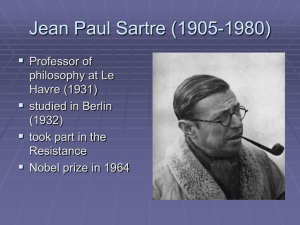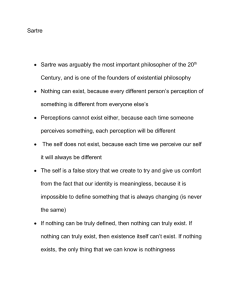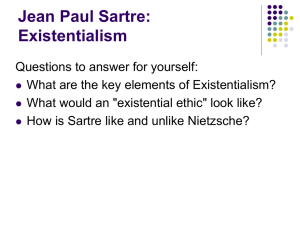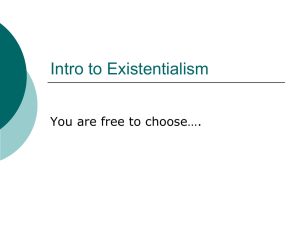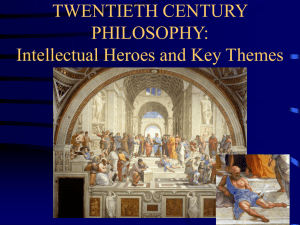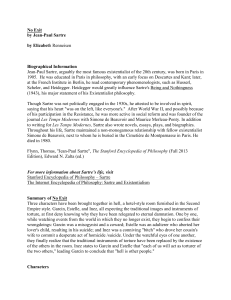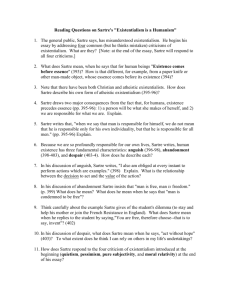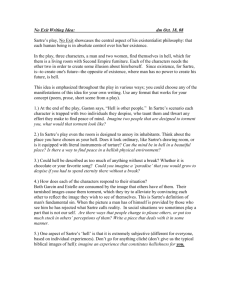Sartre on Our Being God
advertisement
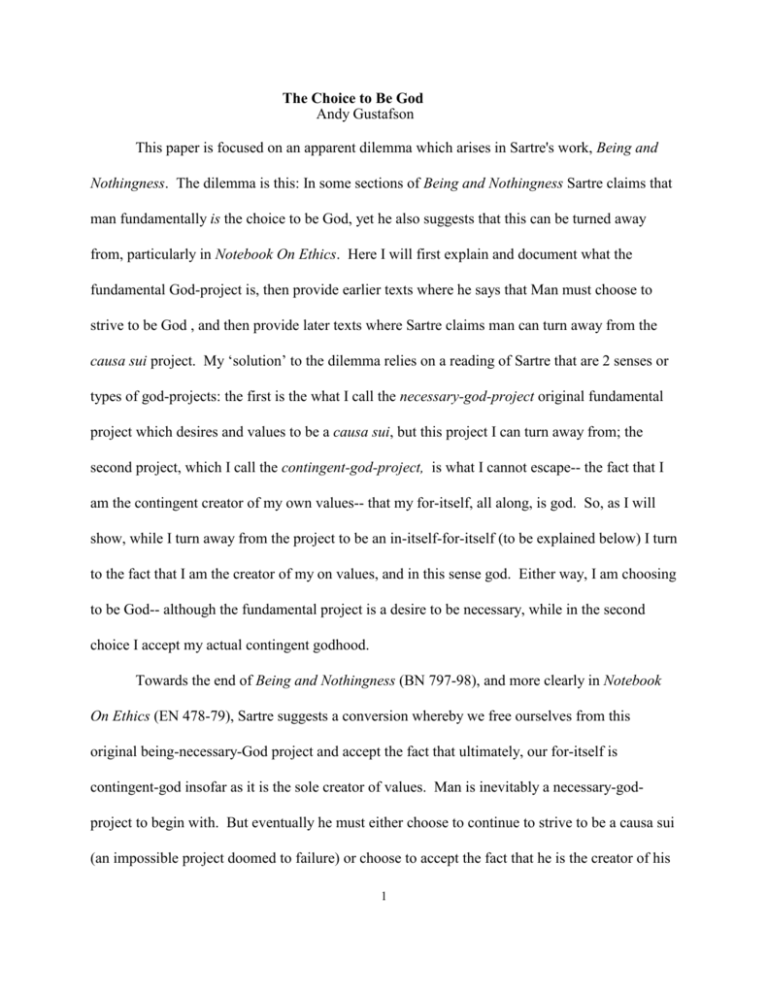
The Choice to Be God Andy Gustafson This paper is focused on an apparent dilemma which arises in Sartre's work, Being and Nothingness. The dilemma is this: In some sections of Being and Nothingness Sartre claims that man fundamentally is the choice to be God, yet he also suggests that this can be turned away from, particularly in Notebook On Ethics. Here I will first explain and document what the fundamental God-project is, then provide earlier texts where he says that Man must choose to strive to be God , and then provide later texts where Sartre claims man can turn away from the causa sui project. My ‘solution’ to the dilemma relies on a reading of Sartre that are 2 senses or types of god-projects: the first is the what I call the necessary-god-project original fundamental project which desires and values to be a causa sui, but this project I can turn away from; the second project, which I call the contingent-god-project, is what I cannot escape-- the fact that I am the contingent creator of my own values-- that my for-itself, all along, is god. So, as I will show, while I turn away from the project to be an in-itself-for-itself (to be explained below) I turn to the fact that I am the creator of my on values, and in this sense god. Either way, I am choosing to be God-- although the fundamental project is a desire to be necessary, while in the second choice I accept my actual contingent godhood. Towards the end of Being and Nothingness (BN 797-98), and more clearly in Notebook On Ethics (EN 478-79), Sartre suggests a conversion whereby we free ourselves from this original being-necessary-God project and accept the fact that ultimately, our for-itself is contingent-god insofar as it is the sole creator of values. Man is inevitably a necessary-godproject to begin with. But eventually he must either choose to continue to strive to be a causa sui (an impossible project doomed to failure) or choose to accept the fact that he is the creator of his 1 own values (in effect, accepting the fact that causa sui project is dead, God is missing, and my for-itself is the only god left), but in either case, he is choosing to be God, because he is either striving to be eternal and necessary in-itself-for-itself, or accepting his fate to be the contingent god of his own world as a for-itself. As I will show, it would make no sense to say that man must be able to choose that his for-itself not be contingent-creator-god if he really has a choice, because my God project is intimately bound up with my freedom and so, to be able to choose to not be contingent-God would be to be able to choose to not be free-- which would be to choose not to be man. The choice we do have is, whether or not to strive to be the causa sui-- which is, will I strive to escape contingency, or will I accept responsibility for my freedom?. Ultimately, my freedom to choose determined in this twofold way: a) in that I must have a project and b) that this project is a project to become god. What is not determined is which of the two sorts of god I plan to be, and how I will act out the project, whichever one I choose. Here I will argue that once we understand clearly what the two god-projects are, as well as what conversion entails, and what freedom really is, it will become apparent that we are inevitably free and that the choice we have is what kind of god we will try to become-- the first project is a useless passion, while the second choice is a stoic resolution to live without any god but oneself. I can refuse to strive after the impossible God-project and instead embrace my necessary freedom and in so doing accept that I am the creator of my own self and world by being the creator of my own values. 1. God Project #1: To Be the Causa Sui a. Explanation of being-for-itself, being-in-itself, and being-for-others. 2 To understand Sartre, we must first grasp the three forms of being which are relevant to human existence: Being-for-itself, Being-in-itself and Being-for-others. Each of us is contingent and changing, always having a goal of what it is we want to become-- for example, a popular person, a wise man, or a fit person. Insofar as we strive towards that goal of what we are not yet, we are striving for that being-- the being-in-itself-- the futoral goal. We are constantly trying to escape this contingency by achieving an identicalness with that goal, so that we finally can once and for all become what we think it is we are to be-- so that we can fulfill our projected essence. Sartre says, "Human reality is a perpetual surpassing toward a coincidence with itself which is never given" (BN, 139) This is our desire to become an eternal unchanging self-caused something, independent of contingency, while at the same time remaining a for-itself. This is the impossible synthesis, which is the goal of the necessary-God-project. (BN, 140) The being-for-itself is the lack of being, and the in-itself is what is projected or construed as lacked. Together they form a dyad, for the for-itself must have the in-itself to strive toward, and the being of the in-itself could not exist without the for-itself. (BN 141) We exist as a lack striving to be what it is not, and not being what it thinks it is. The result of this dyad is that humans cannot but help desiring to be what they are not, according to Sartre. But unable to be what they are not, they are destined to be unhappy: The being of human reality is suffering because it rises in being as perpetually haunted by a totality which it is without being able to be it, precisely because it could not attain the in-itself without losing itself as for-itself. Human reality therefore is by nature an unhappy consciousness with no possibility of surpassing its unhappy state. (BN 140) Sartre immediately raises the question of what the nature of this being-in-itself is: "But what exactly is the nature of this being toward which unhappy consciousness surpasses 3 itself?" (BN 140) First, we know that man is fundamentally the for-itself striving for the in-itself, so the in-itself, as a projection, is somehow fundamental to human existence. Sartre's famous line that man "is [as the for-itself] what he is not and he is not [as the initself] what he is" is the most concise statement of that point. (BN 735) Sartre admits that "consciousness can exist only as engaged in this being which surrounds it on all sides and which paralyzes it with its phantom presence" (BN 140) In other words, man is the perpetual striving of being-for-itself towards being-in-itself, so this "phantom presence" which is the being that being-for-itself lacks is a necessary condition for consciousness. But on the other hand, man cannot simply be this in-itself, for then his consciousness would be annihilated. (BN 139-40) In addition, we must remain clear that being-initself is not God (causa sui): "But the being toward which human reality surpasses itself is not a transcendent God; it is at the heart of human reality; it is only human reality itself as totality." (BN 139) God is both what he is and not what he is and is what he is not all at once-- in other words, God is both the for-itself and in-itself simultaneously. That is what man wants to be, but cannot, because it is an impossible state. In wanting to be both the in-itself and for-itself simultaneously, man wants to be God, but being-in-itself per se is not God. The being that I strive for is ultimately value. (BN 143) As Sartre cryptically puts it, "Its being is to be value; that is, not-to-be being. Thus the being of value qua value is the being of what does not have being." (BN 143) The value is striven for, but not apprehended. This value is that absolute being of the self. But that I want to both attain that value (and become an in-itself), while simultaneously wanting to continue striving in consciousness and freedom is the impossible task of being for-itself and in-itself simultaneous-- the project to be necessary-God, or the in-itself-for-itself. Ultimately, Sartre says or the in-itself and the in-itself-for-itself that Man is neither the one nor the other of these beings, for strictly speaking, we should never say of him that he is at all. He is what he is not and he is not what he is; he is the nihilation of the contingent In-itself in so far as the self of this nihilation of the contingent In-itself in so far as the self of this nihilation is its 4 flight ahead toward the In-itself as self-cause." (BN 735) As the one who nihilates himself perpetually-- the self-nihilator-- man exists. But as he exists, he does not exist, strictly speaking, as either being-in-itself or in-itself-for-itself, but as nihilation of the in-itself by the nothingness of the for-itself. That continual act is human existence, and that is lived freedom. Being-for-others, the third mode of being, is an entirely separate frustration for the one who is attempting to secure his escape from contingency-- yet it is important for understanding the necessary-God project. My being-for-others consists of my appearance to the other-- their opinion about me. My awareness of the look of the other, or even the possible look of the other affects me in a way that is outside of my control. (BN 346-54) I cannot control the look of the other, or my being-for-other, because its origin is in the freedom of the other, which eludes my grasp. (BN 310) Love is an attempt to solidify my project through the other. (BN 477) The other threatens me because she has control over my being-for-other. All of my relations with the Other are governed by this frustration with the Other’s having control of my being-for-other, which is beyond my power. (BN 473) This aspect of myself is beyond my control, and so the other thwarts my project to be independently self-caused. To overcome this dangerous otherness, I attempt to domesticate the other so as to control my being-for-other and thereby maintain control over the other as cause of that aspect of my being (my being-for-other). I do not want the other to be forced to see me as I want her to see me (as though I would brainwash her, or make her a robot, or give her a lobotomy), rather-- and this is the paradox-- I want her to freely see me as I want her to see me. “I can seek to recover that freedom and to possess it without removing from it 5 its character of freedom.” (BN 473) b. Freedom and Consciousness What we call freedom is impossible to distinguish from the being of "human reality." Man does not exist first in order to be free subsequently; there is no difference between the being of man and his being-free" (BN, 60) Once we understand the relationship of being-for-itself to being-in-itself and beingfor-others, we can understand what freedom is-- and this is, as I understand it, why my foritself ends up being creator-god. (NE 485) I am fundamentally free, and central to the fact of this freedom is that I must determine my own values and in so doing arrange the order of the world myself-- I "choose the order of our bits of knowledge." (BN, 402) That I am a free being does not mean that I can accomplish this or that so much as I am saddled with the sole responsibility of creating my own values, and in this sense I am God. (BN 14344) Freedom must not be considered in the typical sense of a power or ability. Rather, freedom is principally a lack: "Thus freedom is a lack of being in relation not a given being; it is not the upsurge of full being" (BN 624) Sartre also calls this lack the "hole in being." (BN 624) Freedom is the very lack which is what for-itself experiences as it wants to control the disruption which the other is, as well as to attempt to become simultaneous with the being-in-itself. (BN, 139, 147) This project is the project of man, and the freedom "is the very stuff of my being; and as in my being, my being is in question I must necessarily possess a certain comprehension of freedom." (BN 566) There is no choice whether or not to be free-- "I am condemned to be free" (BN, 567) Again he says, "It [freedom] is not free not to exist or not to be free." (BN 625) I am necessarily free-6 necessarily lacking; and without this lack, which strives towards a projected fullness of being (my for-itself striving towards my projected value which is the in-itself) I would not exist as human being. My freedom arises from the fact that my for-itself is a lack-- the source of nothingness. Now, "Nothingness is not, Nothingness 'is made-to-be,' . . ." and that is also what man is-- not made, and ongoing work, and the lack which makes this open-endedness the central feature of what I am is my for-itself, and this condition is my freedom. The for-itself parcels up the world as it secretes nothingness, and this is consciousness which Sartre equates with choice. (BN 59, 64) My freedom is related to choice then in this way: I have no eternal self-same being, and am therefore thrust into the world without any essential qualities or characters. We have no irreducible tastes or inclinations, for example. (BN 784) We have no essence or nature to fulfill: Human reality can not receive its ends, as we have seen, either from outside of from a so-called inner "nature." It chooses them and by this very choice confers upon them a transcendent existence as the external limit of its projects. (BN 572) Again, that limit is the value, the in-itself as the end which the for-itself strives towards. I am free because I have no essence, but produce myself through active existence: It is therefore the positing of my ultimate ends which characterizes my being and which is identical with the sudden thrust of the freedom which is mine. And this thrust is existence; it has nothing to do with an essence . . ." (BN 572) My existence is fundamentally free, because I am the creator of my own values and limits, and I have no essence or nature which I am to fulfill. I am, quite simply, conscious freedom, which is also to say, a being forced to choose what I will be. In inauthenticity, I strive to be necessary-God-- I attempt to attain being-in-itselffor-itself-- the stability, permanence and eternality of God, while remaining conscious. I 7 attempt to gain control of my own self, and to create myself out of nothingness by getting the other to constitute me in a way which satisfies my vision of what I want to be. Little do I know in this situation that I am striving towards a futile goal-- to be what I ought to be. I am creating myself, but pretending that I am fulfilling what I am destined to be. I rest in the comfort of what I think is destined, but this comfort is self-deception. (BN 8788) We spend much of our lives trying to pretend we are not free. Authentic existence is living with full acceptance of my freedom, and my own determination of value. We are free and willing values whether or not we admit it. Inauthenticity is an unowned willing-a willing while convincing myself I'm not willing (i.e., while convincing myself that I am being compelled). While I want to believe that there is something I should become-some destiny or nature to fulfill, the fact is that I am without such a goal or justification or plan. My existence (meaning, my actions and intentions in the world) is the origin of what I am to become. (BN 133) C. All human beings desire to be God? According to Sartre, man is fundamentally a lack, and human desire alone is enough to prove this. "Human reality by which lack appears in the world must be itself a lack. For lack can come into being only through lack; . . ." (BN 136) Here, I think, we see the necessary origin of the fundamental God-project. I am a perpetual lack because I lack being, and my for-itself (which is the source of nothingness) desires to gain the fullness and density of being-in-itself-for-itself. Traditionally, God is the source of stability for values, or the Good. (NE 145, BN 140 ) Insofar as I strive to be a noncontingent necessary being as a conscious being, I strive to be my own autonomous 8 foundation-- causa sui. (BN, 140) It is clear that we are fundamentally free and that we act only insofar as we are free: "Every for-itself is a free choice; each of its acts-- the most insignificant as well as the most weighty-- expresses this choice and emanates from it. This is what we have called our freedom" (BN 764) But Sartre says more than just that I am fundamentally free-- he also says that this freedom is my choice to be God: Thus my freedom is a choice of being God and all my acts, all my projects translate this choice and reflect it in a thousand and one ways, for there is an infinity of ways of being and of ways of having" (BN 764) It seems then that, since I am fundamentally a free being, I am also fundamentally a project of choosing to be God-- insofar as I am the creator of my own values. It is upon my shoulders to determine my own values, which is– I am the organizer of my world, yet I don’t want this responsibility, and strive to attain a non-contingent state instead. Freedom is the origin of my necessary-God-project insofar as the contingency of freedom is what I am trying to escape, fruitlessly. Many passages lead us to the same conclusion-- that human existence is fundamentally a project to choose to be God. For example, Sartre says that "Human reality is the pure effort to become God without there being any given substratum for that effort, without there being anything which so endeavors." (BN 735) The project of the for-itself (the non-being or not anything which secretes nothingness into the world) to strive to metamorphose into the in-itself is what human reality ultimately is, and it is a futile project, because such a project is impossible. When Sartre speaks of this passionate struggle to be God as a fundamental condition, he often does it without using 9 talk of "choice": Each human reality is at the same time a direct project to metamorphose its own For-itself into an In-itself-For-itself and a project of the appropriation of the world as a totality of being-in-itself, in the form of a fundamental quality. Every human reality is a passion in that it projects losing itself so as to found being and by the same stroke to constitute the In-itself which escapes contingency by being its own foundation, the ens causa sui, which religions call God. Thus the passion of man is the reverse of that of Christ, for man loses himself as man in order that God may be born. But the idea of God is contradictory and we lose ourselves in vain. Man is a useless passion. (BN 784) The charade here is that man pretends to have an essence to fulfill. He pretends that he is an object in the world-- passive, acted upon and eternally while being a self-same thing which undergoes various experiences-- rather than accepting his contingent subjectivity. Man pursues being blindly by hiding from himself the free project which is this pursuit. He makes himself such that he is waited for by all the tasks placed along his way. Objects are mute demands, and he is nothing in himself but the passive obedience to these demands." (BN 796) Sartre says that the for-itself is doomed to perpetual failure because it wants to be its own foundation, as a causa-sui like God (unchanging, immovable, self-sustaining and completely independent), yet it is necessarily merely “the foundation only of itself as nothingness” (BN 139) “Human reality is a perpetual surpassing toward a coincidence with itself which is never given.” (BN 139) Man wants to surpass himself, and he does, but he wants to surpass himself to become God, to reach a point where the continual surpassing ceases, yet to remain free and conscious. All man can actually do is continually surpass himself. While he wants so much to become non-contingent, he can only remain perpetually contingent, striving towards being-in-itself. Why does he continue to transcend what he is? Because for man to become this pure in-itself would be anhiliation, and to become an in-itself-for-itself is a contradiction. 10 (BN 139-140) Man is being-for-itself which is thrown towards the world again and again, continually becoming what it is not, and not being what it is. Sartre says, "I choose myself perpetually and can never be merely by virtue of having-been-chosen; otherwise I should fall into the pure and simple existence of the in-itself" (BN 617) Man cannot be both for-itself and in-itself simultaneously. For man, a being-for-itself to become an in-itself would be for man to cease to exist as man, since man is fundamentally being-for-itself. Sartre says of the notion of "God", It is the impossible synthesis of the for-itself and the in-itself; it would be its own foundation not as nothingness but as being and would preserve within it the necessary translucency of consciousness along with the coincidence with itself of being-in-itself. . . But this return to the self would be without distance; it would not be presence to itself, but identity with itself. (BN 140) The very notion of God is a self-contradiction, yet this is what man wants to be. So man is doomed to be “by nature an unhappy consciousness with no possibility of surpassing its unhappy state.” (BN 140) The unhappy state is that man wants to become what cannot be, but instead he continually becomes what he doesn’t want to be-- contingently continuously changing and transcending himself over and over forever. But this contingency is the nature of the for-itself, and is the nature of freedom, which is what man is-- a conscious freedom. The only way to escape this unhappy state, as we will see, will be to gain a new value, a new goal. 2. Conversion to a Necessary Mission of Contingency and Freedom (contingent-god) I have shown that Sartre says that the god-project is fundamental to existing as a human being, that freedom is not chosen but forced, and that my being free is my necessary god project. From that it seems clear that the god project cannot be turned away from. Yet in Notebook On Ethics Sartre speaks clearly of a conversion by which 11 one turns away from the project of being a causa sui. Even in Being and Nothingness Sartre suggests the possibility of an ethics which has as its fundamental project something other than the desire to be causa sui-- a project "which has freedom for its foundation and its goal . . ." (BN 742) So how can we make sense of this? I think we must make the distinction between the project to be my own causa sui, and the general project of freedom which is that I am the contingent creator of my own values. I can turn away from the attempt to be causa sui, yet I can never stop the perpetual and contingent state of being-for-itself which is what man fundamentally is. There is evidence for such a distinction within Being and Nothingness itself. My reading is an attempt to sympathetically make sense of Sartre, rather than throwing up my hands in bewilderment. To begin with, it should be noted (from the quote above) that Sartre did have belief in the possibility of a project radically different than the one to become the causa sui as laid out in Being and Nothingness. Second, it should be noted that he puts this project off towards a later time-- a time when he wrote Notebook On Ethics where he lays out this project of conversion. I am sympathetic with those who think that there is not simply a radical reversal by Sartre in the Notebook On Ethics, and I think support can be found within Being and Nothingness itself to support a more cohesive view. To seek out a cohesive solution seems to be in accord with how Sartre saw things, since he was alluding already in Being and Nothingness to other sorts of projects. Third, it should be noted that Sartre does not claim that the ethics of freedom would be counter to "the project of being-God", but only that the "full details" of the ethical project's relation to the God-project would have to be laid out. (BN 742) 12 One thing we can be sure of is that human reality is fundamentally the projection of the for-itself towards what it is not, or the in-itself: "Human reality is indeed the being which is always beyond its being-there" (BN 702) That we have such a project is inevitable-- due to the facticity of freedom, which is the fact of not being able to not be free. (BN 625) But it seems that this quest for the in-itself is open-ended-- one need not choose the causa sui (to become in-itself and for-itself simultaneously) as its value. In fact, it is this freedom which makes it possible for me to accept or reject the original being-necessary-God project. I can decide to choose this original project and continue, or I can, since I am the determiner of my own values, choose to seek another value. But obviously, that I can turn away from the original causa sui project is due to the fact that I am the determiner of my own values (i.e., creator-god). Sartre is clear that I can choose my values and ends (BN 143, 639), although I cannot choose to not choose, for I am necessarily free. Sartre goes so far (perhaps too far) as to say that external limits to freedom, like class, race, or societies' rules-- even slavery- are limits only if they are recognized by the self. (BN 680) Yet he says that ontology and existential psychoanalysis show us that the original attitude or choice is a desire for lacked being, and in particular, the being-in-itself-for itself which constitutes the original causa sui project. (BN 731, 747) Yet at the conclusion of his analysis in Being and Nothingness Sartre concludes that the goal of his analysis is to "reveal to man the real goal of his pursuit, which is being as a synthetic fusion of the in-itself with the for-itself;" (BN 797) But it is possible to realize this fact, and still not attain "salvation", according to Sartre. Some realize this project, and that helps them to keep from appropriating 13 things for their own sake, but this can leave them with despair because they might still expect that "their mission of effecting the existence of the in-itself-for-itself is written in things" and if they do, they are condemned to despair because they maintain the causa sui project as their ultimate given value. (BN 797) But the analysis must go further than this, if it is to have its full effect and relieve man from the spirit of seriousness. (BN 596 ff) It must also "reveal to the moral agent that he is the being by whom values exist. It is then that his freedom will become conscious of itself and will reveal itself in anguish as the unique source of value and the nothingness by which the world exists." (BN 797) One might say, in Kierkegaardian terms, that one must go beyond a state of resignation. But up to this point, while different particular projects were seen to be chosen or rejected (to be a doctor or a dentist or a farmer, etc) the underlying unifying project was originally thought to be "the value or the ideal presence of the ens causa sui" (BN 797) But, as Sartre says, What will become of freedom if it turns its back upon this value? Will freedom carry this value along with it whatever it does and even in its very turning back [reversal] upon the in-itself-for-itself? Will freedom be reapprehended from behind by the value which it wishes to contemplate? Or will freedom, by the very fact that it apprehends itself as a freedom in relation to itself, be able to put and end to the reign of this value? (BN 797-98) Here Sartre obviously leaves the possibility open that there may be some other fundamental project than the God-project to pursue. But he is not suggesting that we will not be free, that is, that we will have an option to not have to choose to be the creator of our own values. Rather, the value we may choose instead could be freedom itself: "In particular is it possible for freedom to take itself for a value as the source of all value, or must it necessarily be defined in relation to a transcendental value which haunts it?" (BN 14 798) In other words, might freedom itself become our value-- could it will itself as its own possible and determining value? But here Sartre wonders, "what would this mean?" Would this just be another act of bad faith? Or could it be an altogether different fundamental attitude? Here Sartre only raises the possibility. Ultimately, Being and Nothingness will not answer these questions Sartre raises in the last paragraphs. But Notebook on Ethics provides us with some answers. Conversion Here I will refer to some texts of the Notebooks on Ethics to show that one can turn away from the original god-project (the attempt to be a causa sui), but that one actually can only turn away from the original causa sui project without accepting the fact that one is creator-god already. First, it must be made clear that one can never escape the contingency of existence. The attempt to escape that contingency is the attempt to become a causa sui. But one can turn from this desire to escape contingency, despite the fact that one will always be a for-itself striving to be some sort of being. While Sartre says in the Ethics Notebooks that conversion from the project to be God is possible, he simultaneously thinks that the for-itself must take upon itself a project to be a god of a lesser sort, in light of the death of the old God-project outlined in Being and Nothingness. Inauthentic man hopes to be a God which he cannot be-- a God who is not motivated from outside itself (NE 527), infinitely rich and strong and the one who “ought to be” (NE 145, 147). Instead of this, I accept the fact that I am a being who perpetually surpasses itself, 15 that I am what I am not, and am not what I am, as a contingent existing finite being. But as I make this conversion, I also accept the fact that I am the one who creates my own values, and determine what I will become. In this sense then, conversion leads me to accept responsibility for being my own god, in the sense that I am the creator of values, creator of myself, and lord of my destiny. The only God there is, is man. (NE 520, 526) Instead, as I turn away from this attempt to be my own necessary foundation, I realize that I am God: "The For-itself is God in that it decides that Being has a meaning,. . ." EN 485). It is the for-itself that gives rise to Being (NE 483) and the for-itself is god inasmuch as it is the origin of itself and the world (NE 485)-- not as the unconverted man had hoped for, but in fact in the very way he dreaded and desired to escape. (The way of perpetually self-transcending being-for-itself.) Sartre goes so far as to say, “Through me, Being exists for the absolute and this absolute is me. Through me permanence, eternity (atemporality), right fit, absolute immanence, purity (to be what one is) enter into the absolute and this absolute is me.” (NE 495) Conversion for Sartre is the turning away from my project to manipulate the other to gain control of the ground of my being with necessity. In the original project I attempted to be God, but as I accept the death of God-- of this impossible goal of becoming a causa sui-- I face the fact that the closest thing to a self cause left is me-- a finite contingent being. " . . . man finds himself the heir of the mission of the dead God: to draw Being from its perpetual collapse into the absolute indistinctness of night. An infinite mission." (NE 494) I am the finite being left with the infinite mission-- the unending mission which is, as Kierkegaard would say, the task of a lifetime. I must 16 continually be in perpetual transition, and this freedom from essential grounding is an openness which will be filled in and created by my actions. Our mission is infinite because it does not end and continues into our future. At death the mission ends, but so do I, so insofar as Being is, is has an unfinished mission. "I choose to lose myself so that the world can exist, . . . I choose to be nothing so that the world can be everything, and in this way, since I am the Relation and the Creation in my being, I choose to be what I am . I do not have to give myself the mission of bringing it about that there be Being– I am that mission." (EN 499) I am the mission, and yet, I choose to be that mission. The Choice to Accept the Fact of Freedom The paradox is, until man stops wanting to be God, he will not be able to authenitcally embrace his freedom and accept the fac that he is the contingent creator of his own values (that the for-itself is God). As soon as man loses himself, or gives up his quest to be an eternal self-same something, he will be God, although not the permanent eternal unchanging God, but a dynamic self-creating and perpetually contingent God-- a lesser god than he first was hoping for-- not the causa sui. Insofar as man seeks to be an eternally self-same unchanging In-itself (causa sui) he seeks to be God in the first sense, but even if this project is put off, one still will become God, although a different sort of God. In authenticity, I do not have the same God-project in mind, but in authenticity I do realize that I am God, in a lesser sense. So whether or not I am in inauthenticity, I continue to will to be God, and by conversion, I in fact achieve my goal, although I am not the eternal self-same God which I tried to become in inauthenticity, but rather, a dynamic ongoing self-creating becomer, who is never yet what I am, and always is what I am not. Insofar as I am free, I continue to be God, necessarily, as I perpetually choose what I will 17 be. What I gain in conversion is an authentic freedom: A freedom which wills itself freedom is in fact a being-which-is-not-what-it-is and which-is-what-it-is-not, and which chooses as the ideal of being, being-what-it-is-not and not-being-what-it-is. This freedom chooses then not to recover itself [as in a Platonic recollection] but to flee itself, not to coincide with itself but to be always at a distance from itself. What are we to understand by this being which wills to hold itself in awe, to be at a distance from itself? Is it a question of bad faith or of another fundamental attitude? (BN798) My choice it seems is really a choice of how I will chose to react to my situation. The choices I do have are these: first, I can either accept the fact that I am free, or I can pretend in bad faith that I am not, but in any case I cannot chose to not be free. By free here we mean both that what I am to become is not determined, as well as the fact that as an existing being, I cannot remain self-same or permanent, as I am continuously in perpetual change, and so free of a permanent self or tight moorings. Second, I have the choice to continue to fruitlessly attempt to be my own causa sui, or I can give up this impossible causa sui project and accept my fate to be my the dynamic perpetual creator of my own destiny (creator-god), but again, in either case, I cannot choose to not be god, I can only choose whether to try to be what I can never be (causa sui), or accept my actual position as god of my own world and destiny. So, on this reading, I can chose to convert and turn away from my old causa sui project. Using Nietzschean language, we might say that conversion is a conversion from a useless passion to a joyful passion. Rather than uselessly pursuing my goal to be noncontingentand contingent simultaneously, I accept my contingency and the fact that I create myself and my world. In this sense Sartre seems to be encouraging us towards a Nietzschean will to power. I am in authenticity deciding to choose to be what I already am-- a contingent being, a conscious freedom, which is to say, an undetermined possibility to become what I will-- not an unfulfilled 18 essence, but rather, a without-essence (inessential) being whose only trait is this open-endedness and indeterminacy. That is exactly what my freedom is. Of course I am not free to have an essence, for that would be a freedom to not be free-but this is a contradictory demand, and much like demanding omnipotent God to create a rock to heavy for him to lift, or for a square circle to come into being. To ask that the free human have an option to not choose to be God is absurd, because, again, either one will choose to not be the contingent being that one is (which means that one would attempt to transcend one's contingent self to become an In-itself beyond contingency) or one can choose to accept the fact that one is contingent and self-determined in which case one has accepted the death of the original god project leaving only me to fill the gap. Either way, I am bound to choose to be God. I need not accept my contingency, but I am only fooling myself because I am free whether I want to admit it or not, although this freedom is not the sort of isolated independent non-contingency which the original God-project envisions as the ultimate freedom-- that of the causa sui. To have the option to not choose to be God would be to have the option to choose to become what I must become-- some less-than godlike essence. But that is impossible because there is no such essence for me to fulfill. Finitude and Future Conversion is ultimately the acceptance of an open-ended future, and my acceptance of the fact that what I will become is perpetually contingent upon my free decisions and actions. If I were not finite and contingent, I could not be free. As Sartre says, "In a word, a consciousness is necessarily finite and free; free because it is finite. In its contingent finitude, therefore, consciousness is able to grasp the necessary condition of its freedom and its existence; it cannot 19 refuse it without refusing itself" (NE 492) To ask why man must be free is to ask why man must be man. I am a source of nothing, a projecting projector. Without future, we cannot make sense of what man is but the fact that my future is ‘essential’ to me is the very reason I do not have an essence, and am contingent "the future is not yet determined. Self as accident" (NE492) The future provides the open-endedness which is the condition for the possibility of the ongoing projection which is the life of man. I continue to strive towards what I am not, for this is what I am as man– but after conversion I refuse the project to escape this futoral and time-oriented existence. After conversion I accept this freedom of indeterminacy which is what I must be, in any case. I must give up the project to be timeless and without future or past– the project to become sub specie eternitatus– but I never give up the project of being-for-itself which projects itself towards identities which I want to strive towards, fully knowing that I can never “become” something and never change. The goal-orientation has not been given up, but the old goal has. Conclusion We began with the question of how it can be that I both choose to try to be God and that the God project is fundamental to being human. I have argued that part of the way out of this apparent dilemma is to acknowledge that while one is inevitably involved in the god-project at first, one is free to choose to turn from the original God-project. In addition, the very condition for the possibility of that conversion is the realization that I am contingent because I am the perpetual source of my own values, being, and world-- the realization that I am all the god there ever will be. So the realization that I create myself and my world leads me to give up the project to become a self-same causa sui, because I realize the futility of that goal once I realize that I am shot through with contingency. 20 From the start, I live unauthentically pursuing being-God as my project. Later, I am free to choose to accept the original God-project, but I am free to accept the death of that project and convert to a more authentic project-- a more realistic project. I do have alternatives, but there are some things I have no choice about. I can either choose to continue to try to become God or not, but I cannot avoid the either or choice of either creating my own values (as I accept responsibility as creator of my values), or to strive to escape contingency, feigning permanence as causa sui. I can either choose the futile path of attempting to be God by means of attaining an eternal self-same identity and essence, or I can reject this project and accept my contingent self-creating state, embracing my freedom. I cannot choose to have a project to strive for, for that is what I am as a human– a constant striving towards the future, but I can choose which project that will be-- whether to be a permanent unchanging (yet conscioius) being-- causa sui, or to accept the fact that I am the contingent creator of my values. Bibliography Anderson, Thomas. Sartre’s Two Ethics: From Authenticity to Integral Humanity Chicago: Open Court Press, 1993. Caws, Peter. Sartre Boston: Routledge and Keagan Paul, 1979. Charlesworth, Max. The Existentialists and Jean-Paul Sartre New York: St. Martin’s Press, 1975. Desan, Wilfrid. The Tragic Finale: An Essay on the Philosophy of Jean-Paul Sartre New York: Harper & Row, 1960. Greene, Norman N. Jean-Paul Sartre: The Existentialist Ethic Ann Arbor, MI: University of 21 Michigan Press, 1961. (Ch 5) King, Thomas M. (SJ) Sartre and the Sacred Chicago: University of Chicago Press, 1974. 46-48 Murdoch, Iris. Sartre: Romantic Rationalist New Haven, CT: Yale University Press, 1960. (Ch5) Sartre, Jean Paul. Being and Nothingness. Trans. by Hazel E. Barnes. New York: Washington Square Press, 1956. ___________. Notebook On Ethics. Sheridan, James F. Sartre: The Radical Conversion Athens, OH: Ohio University Press, 1969. 22

